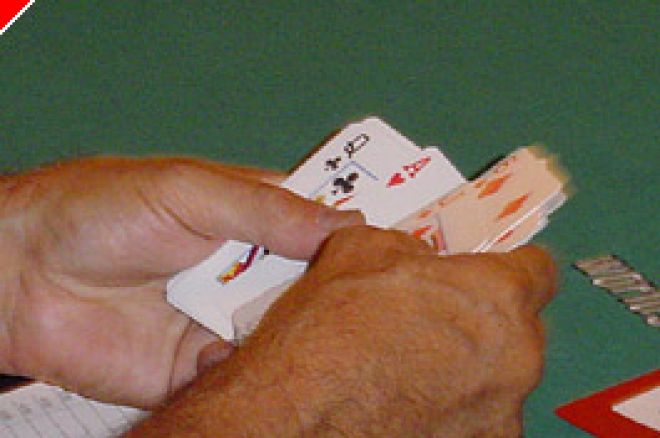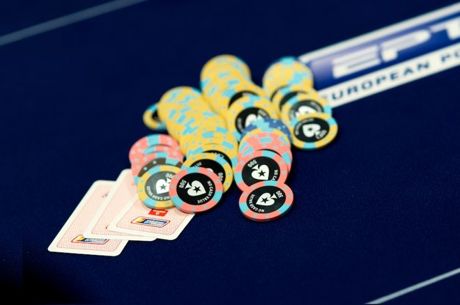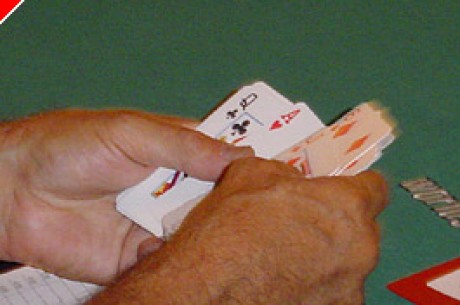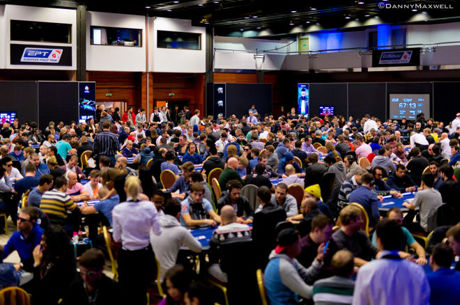Stud Poker Strategy - A Tricky Play

Players starting out in Stud are correctly advised to play straightforwardly - making money from the mistakes of their opponents. At the lower and intermediate levels, these mistakes are frequent. Profit from correct, direct play is nearly assured in the long run.
As the level of your competition gets better - either because you are moving up in limits or because the bad players in your game are replaced by better players- you need to learn some techniques to throw off your opponents. If you continue to play in the straightforward method that got you the money against poor and weak opponents, your better opponents will eventually be able to figure out when you are strong and when you are weak. They will take countermeasures that will deprive you of the profit from your good hands that you deserve while at the same time exploiting your weak and drawing hands with aggressive play.
In a nutshell, if you don't use deception you will lose profit and eventually your bankroll to the better players.
Here is a tricky play to liven up your game against the better and more observant opponents. Don't get into the habit of using this or other tricky techniques routinely. Save them for the occasional time when you believe you either need to confuse your opponent or exploit their assumption that you only play straightforwardly.
Check-Raise when the Ace hits on Fourth or Fifth Street.
$5/10 Stud with a $.50 ante and a $2.00 forced bet. You've been playing very tightly - folding nearly all of your starting hands. You are dealt a low pair (4h Js) 4s. The pot is raised after you by someone with a Queen exposed. It is the highest card out. The raiser has been aggressive much of the time on Third Street. He also seems to be a good strong and observant player.
The bring-in folds. You and one player who called the bring-in with a 9 remain. Your cards are live. No 4s and no Jacks are exposed. The nine folds, leaving you heads up with the Queen. You suspect that the raiser has a pair of Queens, but you're really not sure, since he has been very aggressive with the highest exposed card in the past.
Fourth Street brings the Queen a low unsuited card and you get an Ace. No Aces have yet been exposed. You're high. You're tempted to check and fold - since you're still behind what you suspect is a pair of Queens. You think about betting as a bluff - but figure that the pair of Queens is not likely to go away if you bet with the highest exposed hand.
Here's a chance for a bit of aggressive trickery. Check with the intent not of folding but of raising. The Queen will probably bet, pair or no pair - being aggressive and having seen your tight style in the past few hands. He will probably assume you will fold to his bet - as this has been your habit in the past. Instead, raise the Queen with just your low pair and Ace kicker. There's a very good chance the Queen will fold - knowing that you are a tight player and would not be likely to make this move without at least a pair of Aces or, more likely, Aces up. He will probably assume you called with a low pair and Ace kicker and then raised him with your two-pair when you caught good on Fourth Street. There's no guaranteed of course. But even if he calls you, you have a good back up plan. You might catch another 4 or another Ace, putting you almost assuredly in the lead.
When you compare your hand to your opponent's likely hand you're only a small underdog anyway (you have about a 45% of winning the hand if played to the conclusion). So you might as well use some deception to throw him off and either steal a pot right there or confuse him.
This can also work when you're on a draw on 5th Street, but for different reasons.
Imagine that you have (8h 9s)Tc 7d As against a couple of opponents. The first opponent has (x x ) Kh 7h 7c. He completed the bet on Third and bet out on Fourth. The next player has (x x) 4s 9h 6c.
The first player, with a pair of 7s and, presumably Kings up, bets. You can raise here. You are relying on your straightforward tight image to at least give pause to the King on the next card. He might even fold - since he knows that you know he probably has Kings up, why would you be raising unless you have Aces up or some other powerhouse hand that has the Kings up dominated. I've won the pot many times in this situation with just such a raise.
But even if the King calls he'll be unlikely to bet Sixth Street - giving you a card if you don't catch your straight on Sixth Street. This will also give you another way to win - as you might catch your straight on the River.
As you can see, your tight image can help you craft moves against your opponents that can fool your more aggressive foes into folding or at least into giving you other free opportunities for catching cards that can help you win. Your opponents will also be less likely to take shots at you, since they will be concerned that you may deceptively
But a final word of caution. It is sometimes tempting to make these aggressive moves just because you can, rather than because they are appropriate for the situation. Who among us wouldn't rather raise than fold. It's more fun, especially for those of us who enjoy being aggressive. But the situation must be right. You must truly have a tight, rather than a wild, image - or you will just make your draws more expensive than they would normally be. Your cards must be right too. There is a big difference between making a bluff and a making semi-bluff when an Ace hits. Save the aggressive trickery for times when you have a back-up plan for improvement if you fail to knock out your opponents with your raise.
Full Tilt has great stud action every day. Check it out.








